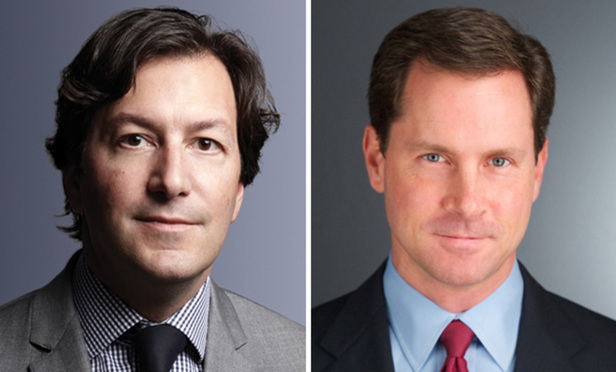H. Christopher Boehning

February 03, 2020 | New York Law Journal
Court Quashes Non-Party Subpoena as Unduly BurdensomeCompliance with Rule 45 subpoenas can subject non-parties to significant burden and expense. Limited case law and secondary sources on this topic leave non-parties with little guidance on the best way to mount effective challenges to non-party subpoenas. But a recent decision from the Northern District of California and new commentary from The Sedona Conference may help change that, which H. Christopher Boehning and Daniel J. Toal discuss in this edition of their Federal E-Discovery column,
By H. Christopher Boehning and Daniel J. Toal
9 minute read

September 30, 2019 | New York Law Journal
Balancing Privacy and Discovery, Court Allows Forensic Imaging of Personal DevicesIn their Federal E-Discovery column, H. Christopher Boehning and Daniel J. Toal discuss a recent case in which the district judge allowed the forensic imaging of personal devices after finding that a compelling need for discovery outweighed privacy interests. This recent case demonstrates the evolving nature of the balancing process between these competing interests and can serve as a helpful guide to judges who will have to navigate the issue in the future, especially as data privacy laws expand around the world and within the United States.
By H. Christopher Boehning and Daniel J. Toal
7 minute read

August 05, 2019 | New York Law Journal
Third Circuit Grants New Trial To Allow E-Discovery Expert TestimonyIn their Federal E-Discovery column, Christopher Boehning and Daniel J. Toal discuss 'GN Netcom v. Plantronics', which serves as a reminder to parties and practitioners of the key importance of experts—and their testimony—as part of discovery. And, importantly, it also highlights the potential significant impact of insufficient discovery processes on the overall outcome of matters.
By H. Christopher Boehning and Daniel J. Toal
7 minute read

June 03, 2019 | New York Law Journal
Court Provides Guidance on Impact of Document Retention PoliciesIn their Federal E-Discovery column, Christopher Boehning and Daniel J. Toal discuss a recent decision from the District of Maryland which provides some guidance on the issue of whether organizations can be held accountable for lack of compliance with their own document retention policies when information otherwise not subject to a legal data preservation requirement has been lost in contravention of such policies.
By H. Christopher Boehning and Daniel J. Toal
6 minute read

April 01, 2019 | New York Law Journal
'Pearlstein' Offers a Primer on Privilege and WaiverIn their Federal E-Discovery column, H. Christopher Boehning and Daniel Toal write: Privilege and waiver issues can be especially vexing, particularly when amplified in the e‑discovery context. In 'Pearlstein v. Blackberry', Judge Katharine Parker helps unravel some of these issues, presenting what amounts to a primer on these topics.
By H. Christopher Boehning and Daniel J. Toal
7 minute read

February 04, 2019 | New York Law Journal
'Flawed' Legal Hold Warrants Sanctions; New Commentary Provides GuidanceIn their Federal E-Discovery column, H. Christopher Boehning and Daniel J. Toal discuss a recent case that provides an example of a party's “flawed” legal hold that led to a discovery sanction. A newly updated commentary from The Sedona Conference could potentially guide organizations in how to avoid such a situation.
By H. Christopher Boehning and Daniel J. Toal
7 minute read
December 03, 2018 | New York Law Journal
Court Weighs Data Privacy Concerns in Discovery AnalysisIn their Federal E-Discovery column, Christopher Boehning and Daniel J. Toal discuss a decision which provides support for those who want courts to factor data privacy concerns into their determinations of the permissible scope of discovery.
By H. Christopher Boehning and Daniel J. Toal
7 minute read

October 01, 2018 | New York Law Journal
'Deficient TAR Process' Leads to Discovery ExtensionIn their Federal E-Discovery column, H. Christopher Boehning and Daniel J. Toal write: TAR often can make the discovery process faster, less expensive and possibly more accurate, but at times it can fall short at one or all of these objectives. This is especially true in situations where the process part of TAR may be reasonably called into question, as occurred in a recent decision where a party's motion to extend discovery deadlines was granted by a receptive court.
By H. Christopher Boehning & Daniel J. Toal
6 minute read

April 02, 2018 | New York Law Journal
Issuing Guidance on ESI Custodians, Court Defers to Responding PartyIn their Federal E-Discovery column, H. Christopher Boehning & Daniel J. Toal write: 'In re EpiPen' breaks new ground on the standards for designating ESI custodians and, more broadly, on the proper scope of discovery under Federal Rule of Civil Procedure 26(b)(1). Judge James provides a clear and coherent set of principles for practitioners.
By H. Christopher Boehning & Daniel J. Toal
6 minute read

December 05, 2017 | New York Law Journal
In 'Microsoft', SCOTUS Will Review Extraterritorial Reach of Search WarrantsFederal E-Discovery columnists H. Christopher Boehning & Daniel J. Toal write: The Supreme Court's eventual decision in this matter could have a significant impact on how U.S. companies, not just Microsoft, conduct business in this modern age.
By H. Christopher Boehning & Daniel J. Toal
5 minute read
Trending Stories
- 1The Fearless Forecaster’s Employment Law Predictions for 2025
- 2Judicial Conference Declines Democratic Request to Refer Justice Thomas to DOJ
- 3People in the News—Jan. 2, 2025—Eastburn and Gray, Klehr Harrison
- 4Deal Watch: Latham, Paul Weiss, Debevoise Land on Year-End Big Deals. Plus, Mixed Messages for 2025 M&A
- 5Bathroom Recording Leads to Lawyer's Disbarment: Disciplinary Roundup
More from ALM
- Scan In Progress: Litigators Leverage AI to Screen Prospective Jurors 1 minute read
- Legal Speak at General Counsel Conference East 2024: Match Group's Katie Dugan & Herrick's Carol Goodman 1 minute read
- Legal Speak at General Counsel Conference East 2024: Eric Wall, Executive VP, Syllo 1 minute read



